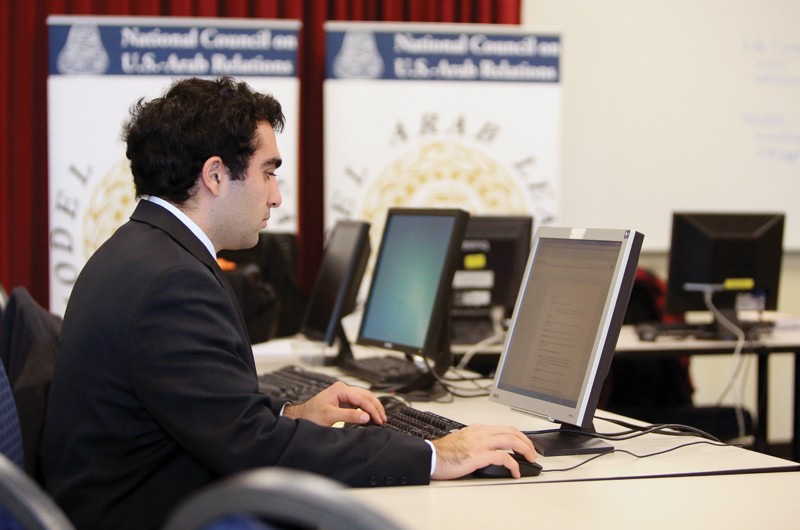Model Arab League promotes ‘globalized perspective’

GVL / Robert Mathews Andrew Abtahi of Northwestern University working on a project during downtime of the regional Model Arab League hosted at GVSU this weekend.
Feb 17, 2013
Grand Valley State University hosted nine Midwestern colleges Feb. 14-16 for the annual Model Arab League, one of 16 conferences across the U.S. that promotes understanding of Middle Eastern countries and issues.
“It’s a simulation of the Arab League, which is the 22 Arab states who have formed their own sort of—it’s kind of compared to maybe the African League or the U.N.—where they deal with problems that affect their region or that they see that they could somehow respond to collectively or share information about,” said Coeli Fitzpatrick, GVSU professor of Middle East Studies and faculty adviser to the Model Arab League student organization.
Following the conference, GVSU was voted overall Outstanding Delegate for representing Saudi Arabia, and a few of its 18 participating students were also recognized for their involvement.
Students Jake Garlik and Taylor Collard were voted Outstanding Delegates for the Political Affairs Committee, Matthew Stowe was voted Outstanding Delegate for the Joint Defense Committee, and J.J. Manser was awarded Outstanding Chair.
Also, this year’s secretary general, Lizzie Heyboer, was reelected secretary general for next year’s conference, and fellow GVSU student Maddy Mihaly was voted assistant secretary general.
Fitzpatrick said the students involved have been training since the beginning of the semester—and some even the beginning of the year—to prepare to represent one of GVSU’s countries: Sudan, Iraq or Saudi Arabia.
Students from each school were divided into groups representing their assigned countries and then again divided into different committees: Palestinian affairs, joint defense, political, social and environmental.
“Each group is given four questions that were set last year and on those four questions they have to come up with resolutions,” said Heyboer, a GVSU junior. “Each delegate from each country is required to play in character, so if you are Saudi Arabia you have to act like you are from Saudi Arabia and what a Saudi would say and what they would want. So you’re representing that country and their policies and you have to work together to create a solution or a suggestion or a plan for how to fix that problem.”
Fitzpatrick said the students must work to see if there’s a proposal all countries can agree upon. “It’s a really good way to learn about the issues that are of concern to the Arab countries because students have to really study it,” she said.
The professor said she thinks it’s important for upcoming graduates to know about affairs in the world, especially the Middle East.
“The Middle East is important to the United States for security reasons or for the energy that it needs but it’s a globalized world and we’re all interconnected and the stereotypes about Arabs and about Islam, for example, are widespread in the United States,” Fitzpatrick said. “You would think with such an important strategic relationship that informed knowledge about the region would be important and this helps to give some of that knowledge.”
Heyboer has represented Lebanon and Tunisia in past conferences. “(They’re) not countries that you usually think about very in depth,” Heyboer said, adding that it was a “unique experience” getting to know their social, economic and environmental policies. “Just being immersed in one particular country and being able to learn all of its policies, I think you get a really nuanced view of something that you might not originally think of.”
This year, Heyboer oversaw the event and worked with the different committee chairs to clarify procedures. However, she said she still values the experience she’s had representing countries.
“I think it promotes understanding and it helps you learn,” she said. “I know through this program when I started it I didn’t know a lot about the Arab world. I mean I knew what I learned in class, but it grew just by being immersed in something like this so I think it’s just a way for people to get a specialized knowledge about a region, but also for people to get a globalized perspective.”
Josh Hilbrand, GVSU alum and deputy director of student programs at the National Council on U.S.-Arab Relations in Washington D.C., said the conferences not only help students learn about the Middle East but also develop leadership and other useful skills.
“It produces student leaders and it produces good speakers and it produces people who can go on and fill jobs in a meaningful way,” Hilbrand said.
Participation also opens students to opportunities like internships in D.C. and free study trips to the Middle East to meet ministers, education officials and local students.
GVSU offers a Model Arab League class, which most of the participants take, but some are involved in the new Model Arab League student organization and are participating in the conference for fun, not class credit.
The student club formed this year so those involved could participate more often throughout the year than just during the spring conference.
For more information about the club, check it out on GVSU’s OrgSync.























